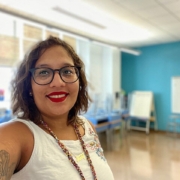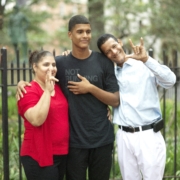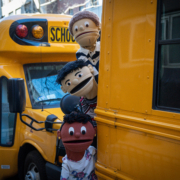At The Foundling, we see education as the pathway to independence. Our programs lay the groundwork for healthy development, wellbeing, and self-determination by teaching critical life and learning skills. We know that education is much more than what happens in a classroom, and includes families learning to communicate effectively, children navigating life challenges without strong family support systems, and young adults relearning habits to change the trajectory of their lives. This is especially true today, nearly eight months since the coronavirus pandemic began.
The 2020-2021 school year will undoubtedly present unique challenges for students and their families and caregivers—but for those involved in the child welfare system, they will have to overcome even larger hurdles and obstacles. That’s why The Foundling is doubling down on efforts to provide educational programming and support services to hundreds of students across our community.
Read our roundtable conversation with Foundling staff and expert leaders from our organization who work closely with students, families, tutors, mentors, and teachers—and you’ll hear firsthand how the school year is going so far.
|
PARTICIPANTS |
|
 Clarisse Miller Clarisse Miller
The Foundling’s Fostering College Success Initiative
 Jessica Nauiokas Jessica Nauiokas
Head of School, Mott Haven Academy Charter School
 Joni Rivera Joni Rivera
Road to Success, Road to Success Citywide, and Afterschool Allies at The Foundling

Elizabeth Tremblay
School Based Mental Health at The Foundling
 Michelle Watsula Michelle Watsula
School Based Mental Health at The Foundling |
How are students faring with their return to school?
Jessica: Our students love coming to school, so we are cognizant of how learning remotely impacts them emotionally and mentally. Creating a structured routine and predictable schedule has really helped. School is in session using Google Classrooms from 8:00am-2:00pm and students interact with their classroom community virtually and complete pre-recorded activities throughout the day. They have blocks of time where they are encouraged to take breaks and get their bodies moving!
Michelle: Students are happy to be back at school and to have the ability to see their teachers and friends. Some students are disappointed with the low turnout of other students returning for in-person instruction—they miss the “normal times” from last year. And the student who are fully remote are sad that they aren’t blended, but their parents opted for remote learning due to having other people in their home who are immunocompromised.
How do you keep teachers, staff, students, and parents motivated each day?
Jessica: We plan virtual classes, assignments, events, gatherings, and meetings with a single question in mind: How do we uplift everyone and bring joy to the learning experience? We also hold monthly student celebration community meetings, weekly staff circles, and weekly “Coffee Hours” for families. Our team also makes surprise ‘cookie and treat’ deliveries to families!
How are students staying connected and maintaining friendships this semester?
Clarisse: We’ve increased the number of workshops we do so that students are interacting more with us and each other. Students are staying in touch with their friends through phone calls, video chats, social media, and interactive video games. Some make time to hang out or form study groups—which is really nice to see take shape. Kids need these social touch points to stay connected and to maintain friendships, and they’re doing a great job so far!
Michelle and Elizabeth: Some students are able to spend time with peers who live in their direct neighborhood, but many are feeling isolated and frustrated with the lack of social interaction. In some of our high schools where we provide therapy to students, we’ve seen freshmen feeling socially disconnected and struggling to make new friends because they’re not physically in school. We’re making the most of tech tools like Google Classroom to run interactive events and workshops that help new students meet classmates. We want to give them every opportunity possible to make new friends and feel connected. In recent weeks, we’ve seen some great participation and success.
How are your teams adjusting to working remotely?
Michelle: They have been creative in engaging students, families, and faculty through virtual workshops. In October we began re-entering NYC schools, and are now using a hybrid of in-person and telehealth services—whatever each individual school needs is what we deliver.
Joni: Our tutors have been extremely innovative! They’re using a multitude of technological tools and platforms to match the different learning styles of our students, like giving styli to students who learn best when they can write and draw on their tablet screens. We’ve created remote learning tip sheets, supplied links to additional online learning resources, and developed a training program on remote learning best practices.
What challenges are you facing—and what do solutions look like?
Joni: Given the changing academic landscape, some of our goals related to college access have shifted. Standardized tests like the New York State Regents exams and SAT/ACTs are largely cancelled, so we have been working with students to instead boost their math and English language grades in order to demonstrate college readiness without standardized tests. At the same time, we’ve been adapting to support 9th grade students entering high school. Research has demonstrated that this time of transition is of particular importance in predicting graduation rates, so we’re prioritizing support for these students to ensure they don’t fall off track with remote learning.
Elizabeth: It’s hard to get know new students when our team has not been able to meet them in person. We’re trying to balance addressing each student’s learning needs and their social emotional needs. We can’t ignore the stressors caused by the pandemic, but we also don’t want students to fall behind in their classes. Collectively, students have shown to be incredibly resilient and strong, and eager to make their new routines work in the most successful ways possible!
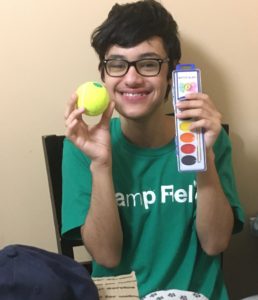
 P.S. Interested in other ways to support The Foundling? Visit AmazonSmile and choose The New York Foundling as your AmazonSmile charity. The Foundling will receive a portion of every dollar you spend – a simple way to give back as you shop online, at no cost to you!
P.S. Interested in other ways to support The Foundling? Visit AmazonSmile and choose The New York Foundling as your AmazonSmile charity. The Foundling will receive a portion of every dollar you spend – a simple way to give back as you shop online, at no cost to you!

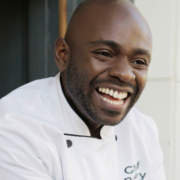

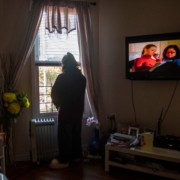

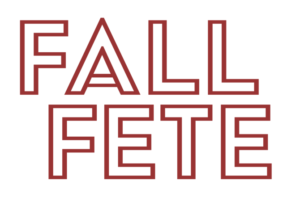
 And our guests met Denisha, a young woman in our supportive housing program who shared these words when reflecting on what it meant to finally find her own apartment and a dream job as a teacher:
And our guests met Denisha, a young woman in our supportive housing program who shared these words when reflecting on what it meant to finally find her own apartment and a dream job as a teacher: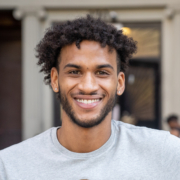 “The Foundling saved my life. I have a stable place to call home and now see myself going to a four-year college.”
“The Foundling saved my life. I have a stable place to call home and now see myself going to a four-year college.”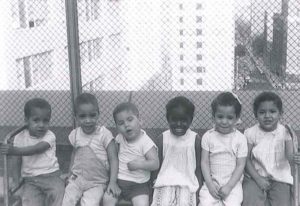

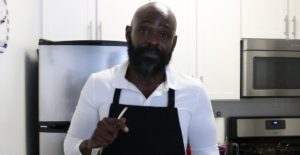

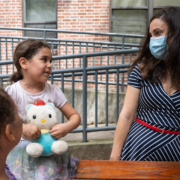
 Clarisse Miller
Clarisse Miller
 Jessica Nauiokas
Jessica Nauiokas Joni Rivera
Joni Rivera
 Michelle Watsula
Michelle Watsula
